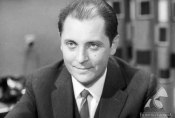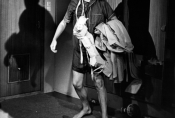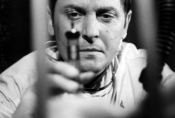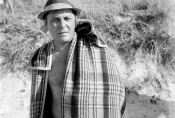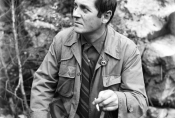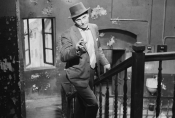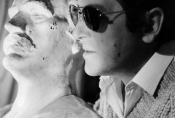Zdzisław Maklakiewicz
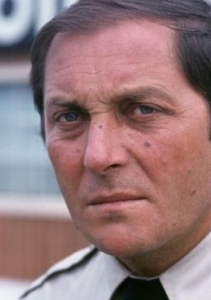
“Nobody can play seemingly common and uninteresting characters as convincingly as Maklakiewicz,” Tadeusz Konwicki once said. “He had his own distinctive style, even in bad or even terrible films,” Krzysztof Mętrak commented. “He was not a star. He did not even play leading roles. But he was an outstanding personality in in the acting world,” Aleksander Jackiewicz wrote about him in 1983.
He was born on July 9, 1927 in Warsaw and died on October 9, 1977, also in Warsaw. A graduate of the Acting Department of the Warsaw State Higher School of Acting (1951), he performed in several theatres in the Polish capital: Syrena (1950-1952), Ludowy (1952-1956), and Polski (1956-1957), and later in Ludowy Theatre in Nowa Huta (1958), Wybrzeże Theatre in Gdansk (1958-1962), Dramatyczny Theatre in Wroclaw (1962-1964), Powszechny (1964-1965) and Polski (1965-1967) in Warsaw, Stary Theatre in Krakow (1967-1969), Narodowy Theatre (1969-1972), and Rozmaitości in Warsaw (1974-1976) .
He appeared in over one hundred feature films and television series, mainly playing supporting roles and small parts. He made his film debut as Józef Bednarczyk, a law student, in Wspólny pokój /Common Room (1959) by Wojciech Jerzy Has, based on the novel by Zbigniew Unilowski, exploring the psyche of several tenants sharing the eponymous room, sensitive people unable to find a place for themselves in the surrounding reality.
He was a versatile actor. Many of his roles are a psychologically poignant, such as Moskała in Słońce wschodzi raz na dzień/The Sun Rises Once A Day (1967) by Henryk Kluba, a poetic picaresque ballad, set in a Beskidy village in the first years after the war. Other great performances include: the station waiter in Zofia (1976), the debut feature of Ryszard Czekała, or the dance teacher in Janusz Morgenstern’s TV series Polskie drogi/ Polish Roads (1977). Also noteworthy is the grotesque Captain in Salto (1965) by Konwicki and the man selling a woman’s magazine in Bariera/Barrier (1966) by Jerzy Skolimowski, an autobiographical tale about a young member of the intelligentsia in the Polish reality of the 1960s, and his attempts to overcome the barriers separating him from the world: money, conventions, and hierarchy.
He is best known for his role as engineer Mamoń in Rejs/Cruise (1970) by Marek Piwowski, a paradocumentary story of a cruise ship on the Vistula River and its passengers, which is an accurate metaphor for life in Poland under communist rule. It is on the set of this film that his friendship with Jan Himilsbach started, and the great comic duo that went on to appear (to general acclaim) in the films by Andrzej Kondratiuk: Wniebowzięci/The Ascended (1973) and Jak to się robi/How It's Done (1973). In the forer film, the two friends win the lottery, and since they are both big fans of aviation, they intend to spend the whole amount on flying. In the latter – they want to make a film together, and when it fails, they decide to take up singing. In Kondratiuk’s comedies they both played leading roles, which was a rare thing for them, because they were – above all else – masters of supporting roles. There is, however, one film in Maklakiewicz’s oeuvre – Siedem czerwonych róż, czyli Benek Kwiaciarz o sobie i o innych [Seven red roses, or Benek the Florist about himself and others] (1972) by Jerszy Sztwiertnia, in which he played six main roles: Corporal Władek Jankowski, director Wocek, engineer Bartkowiak, director Grad, and Benek the “florist.”
“It just happens that I do not play major roles, I simply do not have the heart to do that repertoire, those unfulfilled hopes, disincentives of disinterested envy, that romanticism; in short, I do part-time jobs,” he confessed in “Film” (11/2000).
Selected filmography
-
1962
HOW TO BE LOVED
reż. Wojciech Jerzy Has
-
1964
THE MANUSCRIPT FOUND IN SARAGOSSA
reż. Wojciech Jerzy Has
-
1965
SALTO
reż. Tadeusz Konwicki
-
1967
THE SUN RISES ONCE A DAY
reż. Henryk Kluba
-
1970
HYDRO PUZZLE
reż. Andrzej Kondratiuk
-
1970
THE CRUISE
reż. Marek Piwowski
-
1971
HOW FAR FROM HERE, AND YET HOW CLOSE
reż. Tadeusz Konwicki
